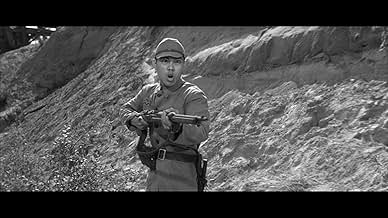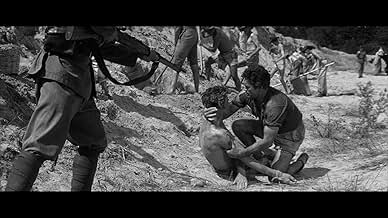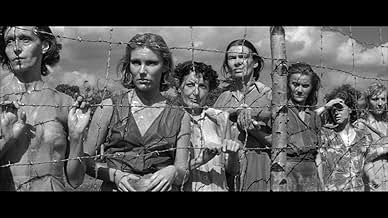Ajouter une intrigue dans votre langueDeep in Malaya, as World War II is rapidly coming to an end, men, women and children, trapped by the Japanese invasion, are held captive in the Blood Island prison camp. Knowing that Yamamit... Tout lireDeep in Malaya, as World War II is rapidly coming to an end, men, women and children, trapped by the Japanese invasion, are held captive in the Blood Island prison camp. Knowing that Yamamitsu, the sadistic commandant, will murder them all when he learns of his country's defeat, ... Tout lireDeep in Malaya, as World War II is rapidly coming to an end, men, women and children, trapped by the Japanese invasion, are held captive in the Blood Island prison camp. Knowing that Yamamitsu, the sadistic commandant, will murder them all when he learns of his country's defeat, Dutch, a Dutch planter, smashes the camp radio. British officer Lambert and, in the women'... Tout lire
- Réalisation
- Scénario
- Casting principal
- Lambert
- (as Andre Morell)
- 'Dutch'
- (as Carl Mohner)
Avis à la une
There is some fine acting on display, both from the actors playing the Japanese, who convey a sense of alien culture without becoming ridiculous, and those portraying the physically drained and starving prisoners: the opening shots of the young man struggling to dig his own grave are actively disturbing, both for his apparent emaciation and for his dragging movements of utter collapse. Andre Morell, of course, dominates the film as the obstinate and authoritarian Colonel Lambert, and in a sense the plot structure consists of gradually justifying his seemingly unreasonable behaviour -- but it is not that simplistic, and the revelation of the final consequences of his decisions (was it, ultimately, all unnecessary?) leaves a note of deliberate ambiguity.
The prisoners in the women's camp are, perhaps inevitably, shown as rather more glamorous than their male counterparts, with their fetching dishevelment a token gesture towards the starvation and illness stated in the script. Barbara Shelley, playing Kate, does appear rather too healthy in her close-ups for the degree of weakness and collapse she is supposed to portray during her escape. But unsurprisingly this is a male-dominated film, and all the really intriguing characters are male. Lambert himself, and the fretful diplomat Beattie, chafing under what he sees as the military mishandling of their situation. Father Paul, jeopardising his life and his cloth to pass messages via the medium of the funeral Mass. The former planter Van Elst, driven to repeated risky sabotage.
For a film that was condemned on release for its 'orgy of atrocities', "The Camp on Blood Island" is actually quite restrained in what is implied, let alone shown on screen: the horrors and Japanese 'bestiality' are as much psychological, based on petty humiliation and anticipation, as anything else. This is not torture porn -- the worst that we see is machine-gunning, plus one clean beheading. ("Bridge on the River Kwai" actually goes further in this respect.) But there is never any doubt that the prisoners' situation is horrific, and that ultimately they are prepared to throw lives away in a desperate attempt at group survival.
A strong film about the prolific sub-genre of Concentration Camps with usual ingredients as sadistic commandant , ominous wardens , heinous soldiers carrying out barbaric orders and inmates suffering savage punishments . A cruel film dealing with the ruthless , brutal truth about the most barbaric prison camp in the annals of warfare . Being allegedly based on facts , authenticated by the very few who survived the massacre in this terrible camp .Although in the opening credits explains : all characters and the names used are fictitious . The film boasts of a good plethora of Britsh actors , Hammer's regular , giving decent acting as Andrew Keir as Colonel Lambert who commands the group of prisoners , Michael Goodliffe as the Camp's Chaplain , Michael Gwynn as Shields, Carl Mohner as Dutchman Van Elst , Philip Brown as pilot Bellamy and a known Hammer Screen Girl : Barbara Shelley .
The motion picture was well directed by Val Guest . He was a prolific and uneven craftsman , and outstanding in Science Fiction and Fanfasy films as The Quatermass Experiment, Quatermass II, The Abominable Snowman , The Day the Earth Caught Fire and When Dinosaurs Ruled the Earth , Hammer's failure follow up to One Million Years B. C. Rating : 6.5/10 acceptable and passable .
It was Guest who, with his international hit «The Quatermass Xperiment» (1955), pointed Hammer on the profitable path of "cinéma fantastique." However, apart from this film and its sequel «Quatermass 2,» Guest did not return to horror, not even when he made «The Abominable Snowman,» a good drama that he kept on a more philosophical and mystical plane, away from frights.
Before finding a more viable breakthrough to mainstream cinema with «Expresso Bongo» (1959), produced by his own company, Guest made for Hammer psychological dramas, thrillers and the war diptych consisting of «The Camp on Bloody Island» (1958) and «Yesterday's Enemy» (1959), a kind of war claim made to Japan, through cinema.
«The Camp on Bloody Island» was a box office success that consolidated the distribution of Hammer products through the American company Columbia Pictures; which addressed, 13 years after the end of World War II, the mistreatment received by British prisoners of war in a Japanese prison, located in the fictional Blood Island, on the former British colony of Malaysia. By then Columbia was preparing the release of a movie with a similar theme, «The Bridge on the River Kwai» by David Lean, which garnered attention and awards, but this did not prevent the Hammer production, despite devastating criticism, from being a hit. «The Camp on Bloody Island» was bolstered by the best-selling novelization of the script by John Manchip White and Guest.
Inspired by real events, the film of course took the "Hammer-style" way, with scenes of violence and sensational effects to impress the audience, and a little bit of eroticism. Of both films, this is the most dynamic, with the action taking place in two main locations, a prison for British soldiers and a diplomat, and another for women; but from the dramatic point of view, it is the weakest. The script delineates the characters with a few strokes and all the credibility falls on the actors' backs.
In the case of the British, the balance is fortunate, in particular, with the work of André Morell, as the leader of the prisoners, who tries to hide information from the Japanese, boycotting their communication system, to stay alive. However, for the Japanese roles... Hammer did whatever it took to achieve its purpose, including casting the magnificent Indian character actor Marne Maitland as a Japanese villain. Of course, Maitland, as always, is the most wicked villain, with a squeaky little voice, which makes him meaner. I could not help but smile at the sight of dear old Marne, who I have seen in so many movies, squinting his eyes!
These two small, low-budget and effective films, in addition to the remarkable films that I knew and mentioned at the beginning of these notes, have increased the esteem that I already had for Val Guest's work.
In place of Sessue Hayakawa's noble commandant in Lean's film, the Japanese are here portrayed as utter, brutalised sadists (with their own men as well as the prisoners), which caused controversy when this film originally came out but didn't hurt it at the box office.
Le saviez-vous
- AnecdotesThe novelization of the screenplay was a spectacular success, selling up to two million copies.
- GaffesAs in most war films, the time between the pulling the pin on the grenades and its detonations are wrong (it's happening sooner). There are roughly twenty seconds in-between. It is, however, wrong to assume that the arming process begins as the pin ("Transport Safety") is removed: The Fuse is activated as the grenade is released by the hand ("Arming Safety"), either dropped or thrown, so the time between pulling the pin and the grenade detonating can vary considerably.
- Citations
Col. Lambert: I've no use for shirkers and there's no room for self-pity here.
- Crédits fous"This is not just a story - it is based on a brutal truth."
- ConnexionsFeatured in Les Archives de la Hammer: Hammer (1994)
Meilleurs choix
- How long is The Camp on Blood Island?Alimenté par Alexa
Détails
- Date de sortie
- Pays d’origine
- Langues
- Aussi connu sous le nom de
- The Camp on Blood Island
- Lieux de tournage
- Callow Hill Sandpit, Virginia Water, Surrey, Angleterre, Royaume-Uni(mining sequences)
- Société de production
- Voir plus de crédits d'entreprise sur IMDbPro
- Durée1 heure 22 minutes
- Couleur
- Rapport de forme
- 2.35 : 1
Contribuer à cette page



































